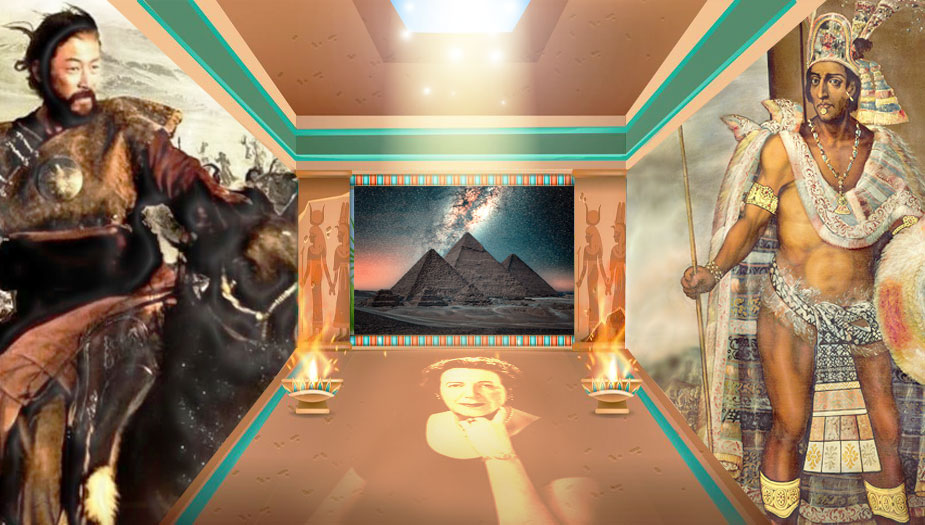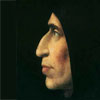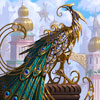Taylor Caldwell: A Journey Into The Past ~ Part II
 The famous novelist, seeking assurance that death brings only oblivion, finds dramatic evidence that she has lived many lives.
The famous novelist, seeking assurance that death brings only oblivion, finds dramatic evidence that she has lived many lives.
by Jess Stearn
Coughing a little, Janet now sat up, as imperturbable as ever, not remembering a thing that she had said. “I have that vague feeling again,” she said, pressing her hands to her ears, “that I am two people.” As she puffed thoughtfully on the inevitable cigarette, I recapitulated. So far, taking inventory, she had been back to England, in Italy, Spain, and on the planet Melina. As yet, we had not taken her to the Biblical period which she wrote about so extensively, to ancient Greece or Rome, or to the favorite haunts of all romantically inclined reincarnationists—Atlantis. So far, she had been scullery maid and nun and I was sure it would be a disappointment that her past experience had not been glamorous.
So in an aside to the hypnotist, unheard by her, I suggested he take her back to a distant time when such a recall would be eminently possible.
As she snuffed her cigarette and made herself comfortable under the blanket, the flight into the past hopefully resumed.
After the usual injunction that she would feel and hear better, and see better as well, she was sent twirling back in time thousands of years.
“Aysha,” she said softly, “I will be the Empress if my mother does not bear a son. My father died and my mother is about to bear a child. It was prophesied that I was . . .” She began coughing, as if her lungs would burst.
“The dust is so hot.”
I had no idea who or what she was, or where, though her name, pronounced like the continent Asia, was certainly provocative enough.
“Who,” asked the hypnotist, “gave you your name?”
“My parents. It is said that in the old language before ours, that Aysha meant ‘The glory of her country.’ That is the old language.”
“Where did your family come from?”
“Egypta. We do not know what Egypta is any more. The great storm came and the old world fell away. There was nothing but the sea. My ancestors came on great ships that sailed the seas for two days and two nights. Our ships sailed like lightning. They sail them in the air too. Faster than the flight of the bird.”
She had obviously gone beyond recorded history, and her airships were pure fancy, for all we knew.
“What propelled those ships?”
“The seer’s wand. It is only a legend. Many, many eons ago the seers warned my ancestors to leave the land near Egypta. Only about ten thousand were warned, because the world was so wicked.”
Was this the flood of the Bible, when Noah, symbolically, took two of a kind into his ark until the land was ready again?
Thinking Egypta Egypt, the hypnotist asked: “What is the legend of the pyramids? . . . Why did your people build pyramids?”
She shook her head impatiently.
“Our ancestors brought the legend that in Egypta they built pyramids. But Egypta died also. Only a few were left on rocks. They begged my ancestors to take them, but they said, no, they could not take them.”
Obviously, Egypt and the Egypta of her subconscious were two different places, though one might have given its name to the other, just as the American aborigines became Indians to Columbus and his men.
“Where was Egypta?” the hypnotist asked. She frowned. “Egypta was not a great land—a big island but not a great land.”
“What happened to Egypta?”
“It was an island. It became part of the land that rose near it.”
“Did the cities become destroyed? Is Egypta still there?”
“So they say. Our ships sail there sometimes, even though it is forbidden. When our ships go there we have to pretend we have presents from the outer isles, which the Greeks call the blessed isles.” A pause. “Have you ever seen the Greeks? I have not seen them. They must be a legend too.”
We still had no idea where her subconscious had come to a halt.
“Did you ever hear of a land called Atlantis?”
She sighed. “It is only a legend.”
“What language do you speak?”
“We are Incan and Mayan. Far, far north there are great cities, and the people do not look like the Incas and the Mayans. Our ships have been there, but it is forbidden land. The people are very fierce and warlike. They do not wear gold and feathers as we do. They are very fierce. It is a great land but very cold.”
“How many people do you rule?” The hypnotist remembered she had been about to become an empress.
“Now that I am an empress”—she wandered a bit—”I can surely choose my husband. Cleato, Cleato … I am an empress. I can surely choose. They would have me marry some other than Cleato.”
In one way or another, she was constantly frustrated, and I was beginning to share some of this frustration, but the hypnotist was more statistically oriented.
“What year is it?” he asked.
“The time we came to this land? 48,362.”
This indeed was a surprise.
“Years?”
“48,362.”
Doubt crept into the hypnotist’s voice.
“How do you know that?”
“It is history.”
“It is written?”
“We have no written language. The written language is known only to the priests. Not to the people. It is given to the priests and the royal family. No need of the people to know the sacred writings.”
He was still puzzling over the date she had given him.
“How many days in a year—what do you mean by a year?”
“There are four seasons, and each season is three months of thirty-one days each. There are twelve months in a year—four hundred eighty-two days. Every ten years on the calendar—the great calendar in the great temple every ten years they make an adjustment and begin with three hundred again and go to four hundred eighty-two.”
The hypnotist’s face reflected his perplexity.
“How much is thirty-one times twelve? Certainly not four hundred eighty-two.”
“At this time,” she explained, “we have thirty-one days in a month and twelve months. But as time goes on it will move—will go forward and then back to three hundred, and start again.”
She was obviously puzzled that this should not be apparent to the two of us. And she focused suddenly on her interrogator. Indicating how deeply under she was, she addressed him as a contemporary.
“Are you a foreigner?” she said sharply. “Where is your home?”
“I’m a Greek,” said he, taken by surprise.
“That is only a legend,” she said with a toss of her head. “They say that they are the fair gods. They are yellow of hair and eyes like the sky . . . Not my eyes. My eyes are black eyes.”
Again our quest for a tangible.
“What color is your skin?”
“The color of the Incas. It is a light gold. Not like the metal but more like …” She searched her memory. “Our sailors brought back a metal we do not know of, and that is the color.”
“Bronze?”
“It is a parody on gold. It is a base metal.”
He asked a few more questions about her Incan life, but she had fallen strangely silent.
I suggested we give her subconscious a change of pace.
“As I talk to you,” the hypnotist said, stroking her brow, “your hearing becomes sharper. You will go back to the year 1200 A.D., back to that period. Genghis Khan.”
For once and all our subject established that she was not a slave to suggestion.
“I never knew any Genghis Khan,” she said flatly.
But reading her books (The Earth Is the Lord’s) we knew better.
“What did they call him then?”
“His name was Temujin. I never knew Genghis Khan.”
“Think of that time,” the hypnotist persisted. “Back in Asia—Mongolia.”
She was half-conscious now, in that curious state of hypnosis where one is aware of the surroundings, even as she is in the subconscious.
“I wrote a book about it,” she said, reacting as Taylor Caldwell, “but someone told me about it, and I do not know who.”
She had received the praise of Tibetan scholars for her story of Temujin, who was to become the Great Khan, and yet she had done little research into the fascinating life chronicled in The Earth Is the Lord’s. Oddly, the chronicle had ended before the young Temujin became Genghis Khan—so she was subconsciously correct in disavowing knowledge of Genghis Khan as such.
“Think about that,” said the hypnotist, sinking her more deeply under. “Did the story of Temujin come to you in your dreams, while you were sleeping?”
“While I was awake. It came into my mind—pictures and names, and I would put them down. While I was writing, I was never in Asia then. It was as if I were watching a play and heard them speak and heard their names and saw the places they went to. Then I would describe it on my typewriter.” She paused, seeming to gather her thoughts. “A man would come into the room and sit down and he would dictate. I did not know what to write next . . . and he would tell me.”
“How was he dressed, and what did he look like?” the hypnotist asked.
“Just a man in a black garment with a gold collar. I thought he was Chinese, but I wasn’t sure. He never told me what his name was or anything. I must have just imagined it.”
“Yet he helped you write the book?” the hypnotist said. “He gave you the information?”
Obviously, the regression, hinting again at the Presence, was not getting into a period that would account for her intimate knowledge of Temujin and the paladins of his youthful surge to fame.
“Let’s get away from the book,” I said, interested in the unfinished Incan experience.
“Just relax and feel yourself sinking deeper,” the hypnotist said, “back in time to your previous life with the bronze people.”
He gave her no suggestion as to time or place. But she soon revealed, as she went deeply under, how real was the Incan experience that she had been describing, for she promptly picked out a historically related experience.
Her voice rose questioningly.
“When they killed the Emperor Montezuma?”
Montezuma, as we knew, was the Aztec emperor in central Mexico who had welcomed the Spanish explorer Hernando Cortez and his soldiers as the descendants of a legendary White God.
History varied as to whether the Spaniards or Montezuma’s own people had killed him, but Janet Caldwell had no doubts.
“The Spaniards killed him. They were holding ransom all our gold. Then they took our gold and killed him.” Her hands went to her eyes as if she were straining to see from behind the shuttered lids. “Beautiful city with lake, canals and bridges. We had the pyramids then.”
“What was the name of the city?” the hypnotist asked.
“Tenochtitlan.”
This was the city where Montezuma had received Cortez and his freebooters in the year 1519.
“That was not the capital city,” she said, contradicting what I vaguely knew of Aztec history.
Montezuma was slain in 1520, and Aztec resistance was broken.
“No one knows where the Emperor was buried, but with him was buried the great key to the Incas [she seemed to be mixing up her tribes], and there are men now digging, and they do not know what they will find. But it will be most astonishing, and there will be the key to the language that all the priests knew.”
She was very much in the sixteenth century now, and more participant than observer.
“You are back there, you are living in that time?”
“I live in an adobe hut with my parents, and we dry peppers and onions in long strings to sell at the market.”
I had been puzzled by one apparent discrepancy.
“Ask her,” I said, “the difference between Aztecs and Incas.”
But she was already moaning, and the explanation was soon forthcoming—another personal disaster.
“Someone hit me on the head and I am going to die. It was a Spaniard. They are not the ones who followed the Lord Shepherd [the White God of tradition] when he came and walked in our empire and the Mayan empire and the far continent in the north. He spoke to all the people and his hair was like gold and he had a beard. Our men are beardless, but he had a beard like the Spaniards. His eyes were like the sky. He said that he must return to his far country, where he would speak to his people, but he gave his angel, Moroni, plates of gold to bury in the far country in the north, and it would be found after many days. He spoke to us in our language and our dialect. He walked in our cities and villages, and all bowed before him. He came from afar.”
And in respect for his memory the Aztecs had greeted the Spaniards as friends.
There was still that discrepancy between the two peoples, and a baffling reference to Moroni, a Mormon spirit, all very puzzling at this time.
“What is the difference between the Incas and the Aztecs?” the hypnotist asked at my prompting.
She seemed to shrug within herself. “What is the difference between any nation or country? The Mayans were more of a dusky hue, and we are more the color of a base metal that looked like gold but was not gold.”
“Montezuma was an Aztec,” the hypnotist said.
“He was our emperor,” she replied with pride. “He was an Inca.”
Instead of having been cleared up the contradiction appeared heightened.
“What is your name?” the hypnotist asked.
“Yanitos.”
“What language do you speak?”
“Inca,” she replied, persisting exasperatingly in her apparent error.
“How,” asked the hypnotist, “did the Incas come from Peru to Mexico?”
She replied in a clear bell-like voice.
“Montezuma’s grandmother was an Incan and she was of a princely tribe. I do not know what it was. For who is going to speak of the Emperor—he is a sacred man. Only he speaks to the serpent god, through the feathers of the serpent’s head. Only he speaks to the god. If you wish to see, you must go to Mexico. They say there is no entrance to one of the pyramids, but now they are finding it. When it is revealed you will know the language. The gods will take vengeance, though, on those who open the tomb.”
After this interlude, the hypnotist explored a time element which had an indicated culture of nearly fifty thousand years.
“When did the Spaniards come to Mexico?” he asked.
“49,820 years.”
This was some fourteen hundred years after the Incan reincarnation, which must have taken place in approximately the year 100 A.D.
“How do they measure their years, from this point?” the hypnotist asked.
“What was the first year?”
“When our ancestors left from far beyond the sea because the land sank below the water. Where we live now the earth rose, and that is why we found anchors for our ship.” She paused. “It is only what the priests tell us.”
Obviously, she was relating the legend of Atlantis, as it was passed on from generation to generation, explaining perhaps the birth of such similar cultures as the Mayan, Aztec and Incan at pretty much the same time.
The next question followed inevitably.
“Go way back in time to the continent of Atlantis, the place that sank beneath the sea, to Egypta and before.”
She had more to say about Egypta.
“Egypta was only an island, not far from the great land where we live—that was once Atlantis.”
Could it be Egypta was one of the Atlantean islands, and that stragglers fleeing the flood had carried their island name to the Mediterranean, just as the English had brought their language to America and an Italian explorer had given it his name?
“Tell me about Atlantis,” the hypnotist said.
“It was a great continent. All who did not live on that continent were slaves, and peasants.”
The hypnotist recalled a legendary tale of the Lost Continent.
“Did you know about the great crystals?”—presumably the source of nuclear energy.
“It was not there,” she murmured. “It is only a legend.”
“Go back in time and tell me what you know about Atlantis. Tell me all the legends there are about Atlantis and Egypta.”
“I never lived there, I never saw it. It was a great continent, they say, greater than all the continents.”
“What do people say about Atlantis?”
“It is only a legend,” she said with a sad note. “We work too hard in the fields carrying stones. We have no time to talk of legends.”
The hypnotist leaned over, touching her eyelids. They quivered the least bit.
“I’m going to bring her out of this,” he said. “She’s not deep enough.”
Suggesting as usual that she would feel better when she awoke but remember nothing, he brought her out of the shallow trance.
She seemed in a daze, rubbing her eyes, as if she had not fully unloaded whatever was streaming through her subconscious.
However, after one or two cigarettes, she became her old ebullient self.
“I feel that I am the only one profiting,” she said turning to me. “You can’t be getting anything out of this.”
A number of things had bothered me during the session, particularly the confusion of Aztec and Inca, and I could hardly wait to consult a suitable reference work.
The Incas, and Andean people, had an amazingly advanced civilization. “Inca engineers demonstrated considerable skill in terracing, drainage, irrigation, and the use of fertilizers,” I read. “Without paper or a system of writing, the architects and the master masons who designed and supervised the construction of public buildings and engineering works in such cities as Machu Picchu and the fortress of Sacsahuaman, built clay models, employing in actual construction sliding scales, plumb bobs, and bronze and stone tools. Without wheeled vehicles for transport, the huge polygonal blocks for fortress, palace, temple and storehouse were emplaced by ramp and rollers, and were fitted with extraordinary precision.”
There was a curious anomaly about a culture which had all this mechanical skill, and no reading or writing facility. Could one facet of the culture have been passed down from a superior civilization—the Atlantean perhaps—while the people, as Janet had said, had been kept illiterate due to a deliberate policy of suppression?
I came back to a line I had passed over in my first rapid reading. “The name Inca specifically refers to its emperor and is used loosely to mean his people.” One of the emperors contemporary with Aztec greatness was Topa Inca. All who worked in government and spoke a certain dialect became the “Inca class,” and many branched out as colonists. And so it was that Montezuma, through his grandmother, could very readily have been of this class. It was obviously a generic term, signifying royalty or nobility, and so, inferentially, an Aztec could also be Incan.
There was another seeming inconsistency in Janet’s Aztec recall: Janet’s insistence on a capital city other than Tenochtitlan, and sure enough, as I riffled through the pages of my trusty Columbia Encyclopedia, there was again an explanation that confirmed her accuracy.
“They [the Aztecs] supported nothing in architecture finer than Teotihuacan, but in the fortification of their island capital they became accomplished engineers.”
Historically, the sad story of the Aztecs and the Incas concludes with the conquests of Cortez and Francisco Pizarro, but this did not end the proliferating influence of these great civilizations, if the subconscious of Janet Caldwell could be given credence.
Miss Caldwell had spoken enigmatically of the White God of long ago, who had given his angel Moroni plates of gold to bury in the far country in the north. In a different session, Janet had turned up these plates in a nineteenth-century Mormon culture, which had always fascinated me, particularly as it had sprung up near an upstate New York area where I had been brought up.
“Men of the north country,” she said. “There is one here who knows the name where the golden plates were found. They were buried there by the angel Moroni.” Her voice drifted off, and then, as if recapturing a scene: “Palmyra, he was a young man. He was given a book by the angel to translate from the golden plate. There were three men who witnessed that: One was a minister . . . I do not know his name.”
I now remembered a page out of history. In 1827, as a young man, Joseph Smith (high prophet of the Church of Jesus Christ of Latter-Day Saints) had founded the Mormon religion after the Golden Tablets containing the Book of Mormon had been revealed to him in a vision of the angel Moroni at Palmyra, New York, not far from Rochester.
Janet briefly traced the course of the Mormons across a rugged, hostile country.
“They killed the young man and his followers [Joseph Smith and his brother were slain in Nauvoo, Illinois, in 1846]. They were moving west over the far country. The Indians attacked them, but the young man was killed before that. They came to a place called the Meadow Valley Pass, and they were massacred, not by the Indians, but by their own people [hostile whites] in Iowa. They went through desert and came to a lake [Salt Lake] that one cannot drink—it is so salt. They set up their tabernacle there [Salt Lake City], and they made the desert bloom like a rose.”
She made every experience come alive. Just as her picture of the Mormons intrigued me, so had her description elsewhere of the early Genghis Khan. All men seemed somehow related as they paraded through Janet’s teeming subconscious, regardless of where these impressions came from. But even subconsciously, she had not had a life experience in the time of the Great Khan, who rose from Tibetan obscurity to become the most powerful conqueror in Terra’s history. She had only the mysterious hovering Presence to guide her description of his rocketing ascent to power. He was to destroy one nation after another in his restless quest for dominion, while a world marveled then as now how he managed to keep his conquering horde together. But as no historian had, Taylor Caldwell, without historical orientation, relying on “imagination,” captured the secret of this success in The Earth Is the Lord’s:
In time Temujin would be a wise and ferocious man, magnificent, endowed with primal and heroic dignity. But it was not all these things that inspired the devotion of his friends. It was something in the glance of his gray eye, steadfast and eagle-like, something in his lifted profile, with its slumbering aspect of awful power and ageless strength. This was a youth fashioned by the mysterious agents of supernatural power to be a king among men, an instrument made by the gods for some dreadful but splendid purpose of their own. And it was all this that Temujin’s friends knew without conscious awareness.
He could inspire devotion in men like Kasar, childlike and unthinking, like the greater mass of mankind. He could inspire love in those like Jamuga, who loved philosophy and wisdom and thought. He could draw the affection of those like Chepe Noyon, gay adventurers, courageous, laughing, eager, and resistless. And then, strangest of all, this youth without pure virtue could seize the passionate adherence of those like Subodai, silent, thoughtful, brave, pure, devoted and lofty. In truth, here was an embryo khan of all men, to whose banner of the yak tails would flock every kind of spirit, including those like Belgutei, who followed a victor in order to share in the spoils.
From whence came this wonderful description of the paladins who carried their young leader to the highest throne? Was it from the Presence—the Lord Darios—who stood ephemerally at her elbow in the silence of the night, tapping an endless record of everything that had ever happened or would happen in this world and others? Or has she been there herself? It was something to think about on a dark, rainy night.
Excerpt from The Search For A Soul: Taylor Caldwell’s Psychic Lives
See Part I here.
To continue reading see pdf download here.
Posted in Other Topics, Reincarnationwith comments disabled.





